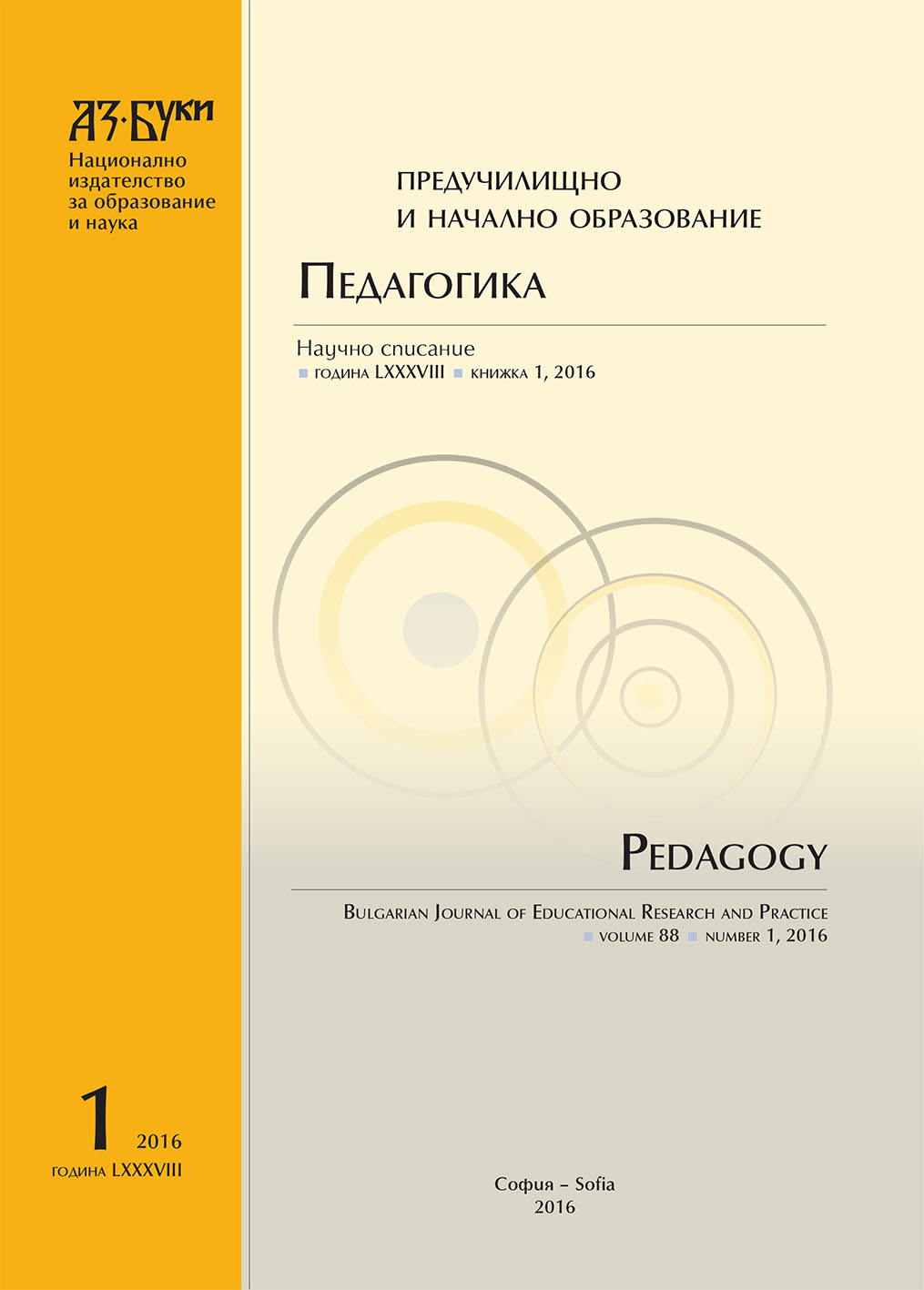
Децата на институцията „възпитателно училище-интернат“
The article presents perspectives on the nature and possibilities of corrective measure “placement in a Correctional Boarding School” under the conditions of CBS.
More...We kindly inform you that, as long as the subject affiliation of our 300.000+ articles is in progress, you might get unsufficient or no results on your third level or second level search. In this case, please broaden your search criteria.

The article presents perspectives on the nature and possibilities of corrective measure “placement in a Correctional Boarding School” under the conditions of CBS.
More...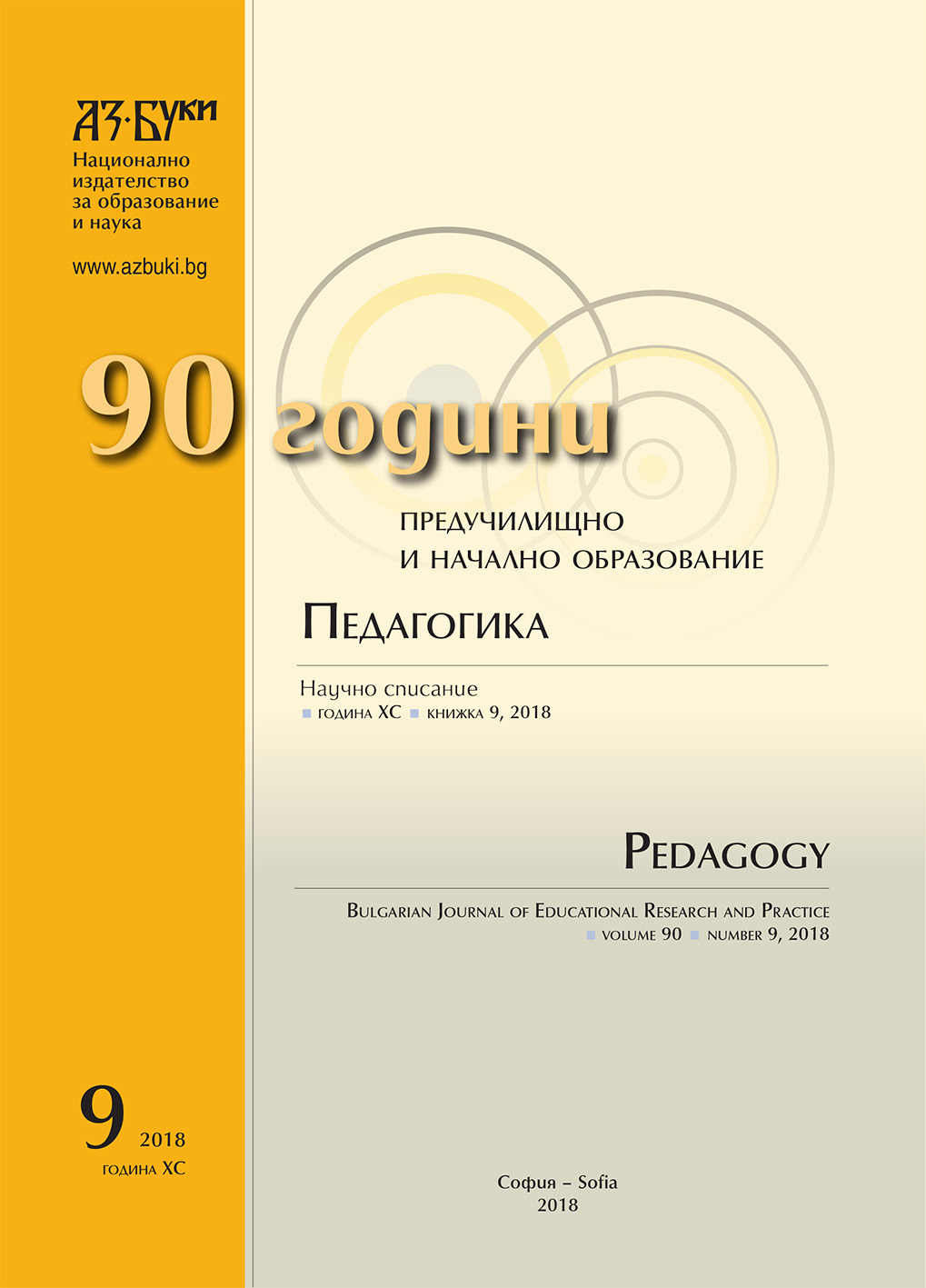
The topics of civic education and children's rights are being discussed more and more frequently in the past 11 years after Bulgaria joined the EU. Civil education is expected to familiarize children with their "equal and inalienable rights, the most important of which are freedom, justice and peace in the world". The outcome of civic education cannot be just “simple voters”, but rather personalities concerned about the public good. Through the civic education, the moral basis of children's rights is internalized.
More...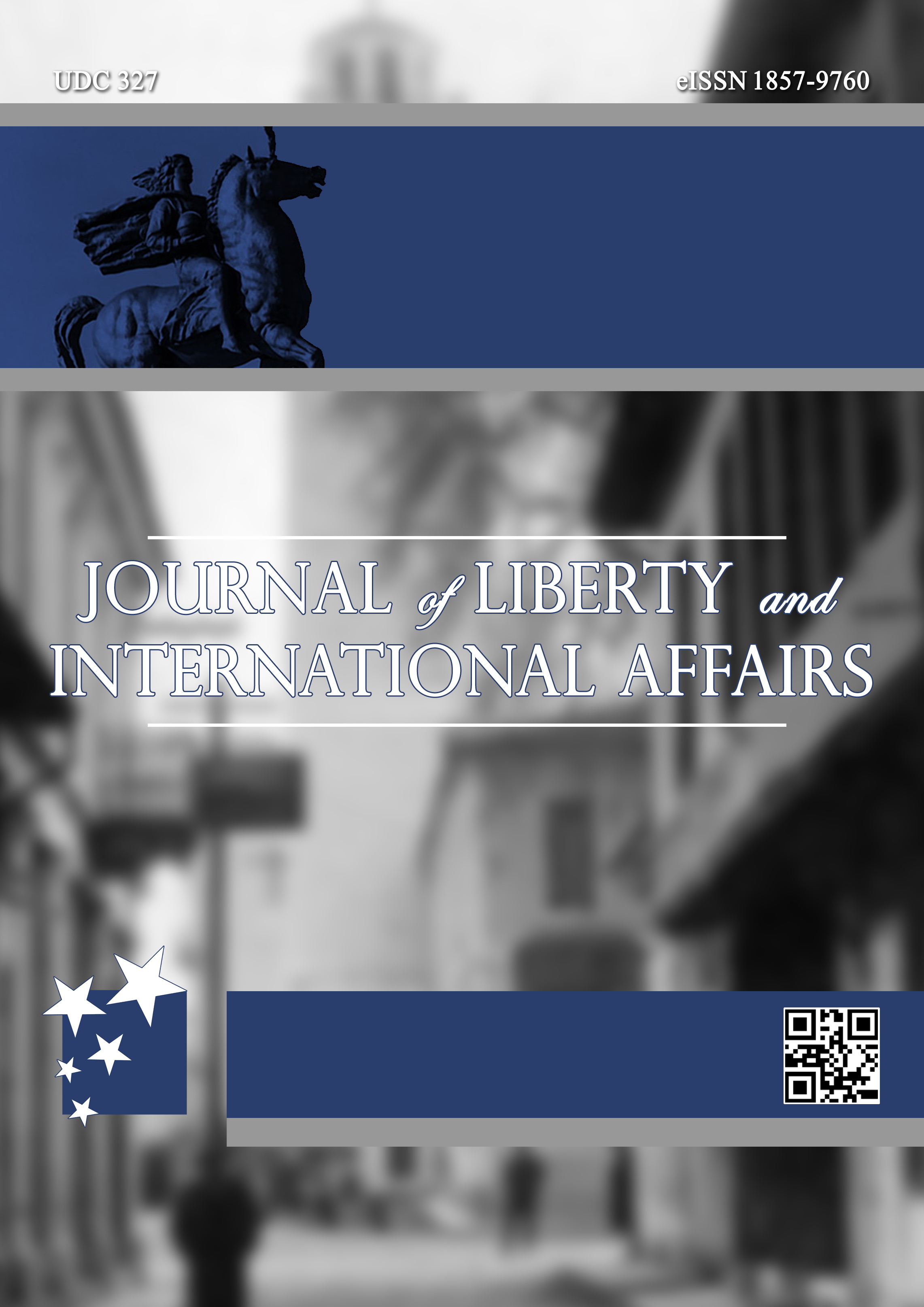
This article aims to explain citizens’ support for the Law on the Use of Languages (LUL) through their demographic characteristics, political participation, party affiliation and ethnic belonging. We base this article on an empirical ordered logistic regression models using an original database of 669 Macedonian respondents. We compare the support of Macedonian public for the LUL with the support for the general idea of promotion of the use of the languages of the non-majority ethnic communities in Macedonia. We argue that both the support for promotion of minority languages in Macedonia, as well as the support for this concrete Law depends mainly on citizens’ ethnicity and party affiliation. We find statistically significant opposition for the LUL among the ethnic Macedonians, the (Macedonian / mainstream) opposition parties, the participants in the so called ‘For a Shared Macedonia’ initiative, and those whose mother tongue is a minority language other than the Albanian.
More...
The politics of godfatherism and regionalism has become a phenomenon in the political development of many nations Nigeria inclusive. The paper examined the determinants and impacts of politics of godson and regionalism in Yobe state. Indeed, the politics of godson or the elites have entered every hook and crannies of the state and have affected the political arrangement of the political system. The paper is qualitative in nature, data were generated from secondary sources where several related articles, newspapers, magazines, books were consulted etc. In explaining the topic under study, the researcher adopted Elite theory. This theory was propounded by Vilfredo Pareto in 1935, the postulation of the theory is that elites could only be replaced by another set of elites, meaning that the majority are unavoidably governed by the minority. The study found that the politics of godfatherism courses and affect the political development of Yobe state by restricting power in the hands of the few, in a specific geopolitical zone of the state. This has leads to inter-party and intra-party defections, decamping and conflicts among the party members. Therefore, the study recommends the adoption of the direct primary election in chosen candidate in all level of governance. INEC should also make a law that will discourage money politics and punish culpritinvolved in such an illegal act. To minimize the politics of Godfatherism, there is a need for political awareness campaigns on the effects of political godson on the political development of the state.
More...
The Republic of North Macedonia, a candidate country in the EU, is continuously subject to conditionality in relation to establishing a professional and effective public administration from the EU institutions and from the civil society. This paper employs the qualitative methodology of process tracing to find out whether the EU conditionality has managed to establish a merit-based civil service. The data are gathered and analyzed for a period of ten years while analyzing the legal and institutional structure of the civil service. The findings identify the factors that hampered or prolonged the implementation of reforms and they offer insights on the conditions necessary for the civil service reforms to take place.
More...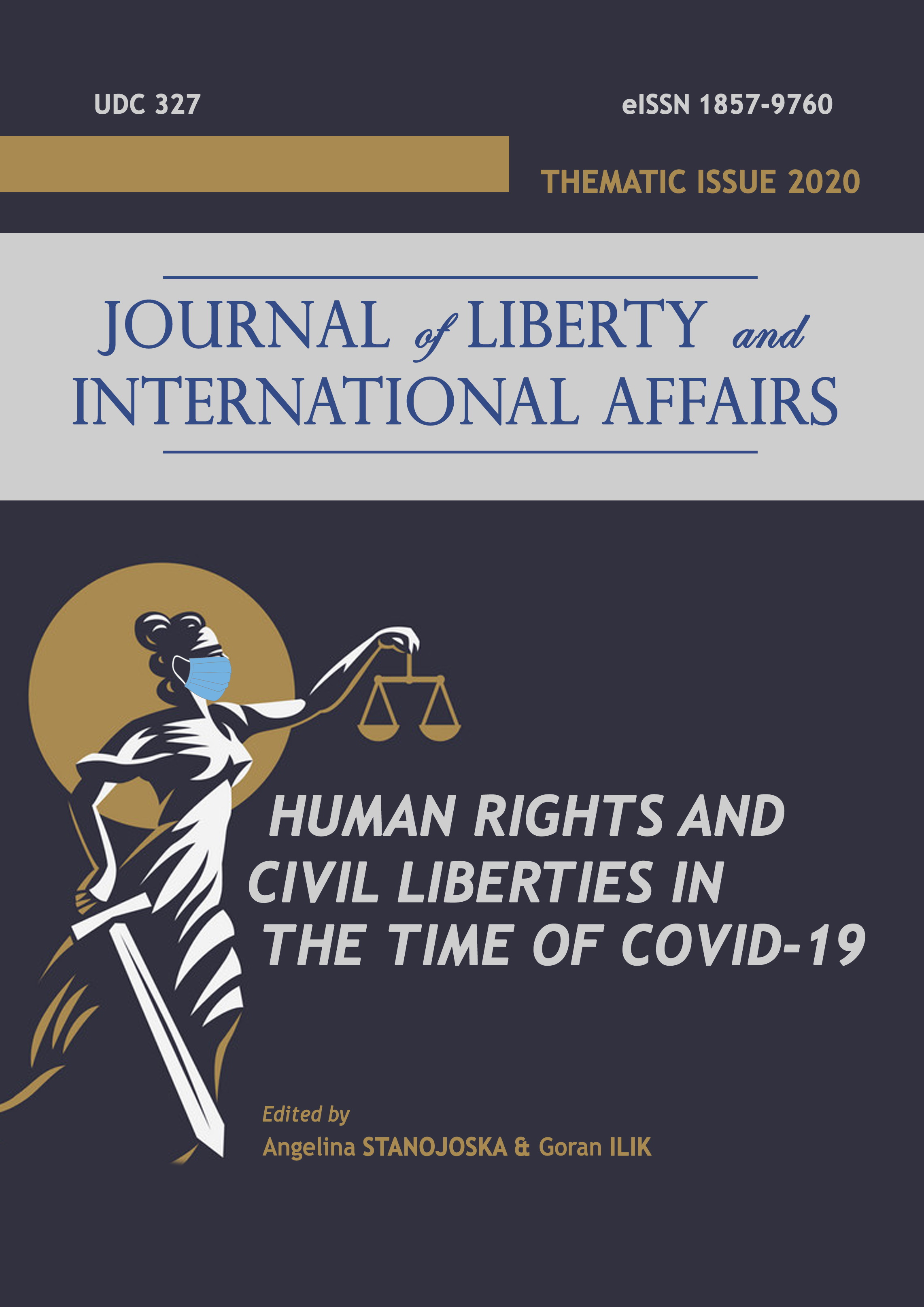
New technologies have opened several risks to safety of journalists. More importantly, in the state of emergency caused by the Covid-19 outbreak, journalists and media actors have shifted their activities online more than ever, which also made them more prone to digital threats and attacks. In some regimes there are even organized intimidation campaigns against political opponents causing chilling effect and self-censorship, and jeopardizing freedom of expression in general. Hungary as a member of the European Union since 2004 and Serbia as a leading candidate to join the EU are two countries where the problems and concerns about media freedom is growing every day. The fear from the unknown during the international pandemic gave opportunity to some governments to hide their real political agendas and cover their desire for the 'good-old-fashioned' censorship. The number of countries where some kind of censorship could be found is growing every day. The authors will show two country-case-studies from Hungary and Serbia, where the leaders and the political situations are very similar and could show a (good or bad) example to other countries that would like to follow the illiberal views on media issues.
More...
The worldwide pandemic caused by the coronavirus has disturbed the pure conception of the separation of powers. States forced by the newly established situation, declared a state of emergency, thus the Republic of North Macedonia was not an exception. This paper will focus on the divergences from the separation of powers in the countries from the Western Balkans and across Europe whose departure in the well-established system of checks and balances intrigued the media. The case of North Macedonia was maybe the most interesting because in time of declaring the state of emergency by the President of the Republic, the legislative branch of power – the Assembly was dissolute which meant that the already difficult situation became more complicated to establish a balance between the branches of power to function in protecting the general health of the citizens and the fundamental human rights and freedoms.
More...
Egypt and Turkey makeup about half of the whole population of the Middle East and are the two leading nations in the eastern Mediterranean, including Iran as a whole. Both countries are now recognized as the two most tremendous modern military forces in the Middle East. Besides, Cairo and Ankara are major Muslim centers: the Al-Azhar Mosque in Egypt is the largest Islamic University in the world and a significant feature of Egyptian soft power; the historical association between Turkey and the last Islamic Caliphate is viewed in the region with great nostalgia. Given these similarities, a deep rivalry between the two countries exists around the world, while Ankara and Cairo have increasingly prevented overt aggression or conflicts. After the Arab Spring, tensions have intensified and, in effect, impacts Libya, Sudan, and the Eastern Mediterranean region. Along with the increased risk of an overt war between the two nations, the rivalry between Turkey and Egypt also challenges the delicate security of the Middle East. It indicates that it needs an international mediator to answer this thorny problem.
More...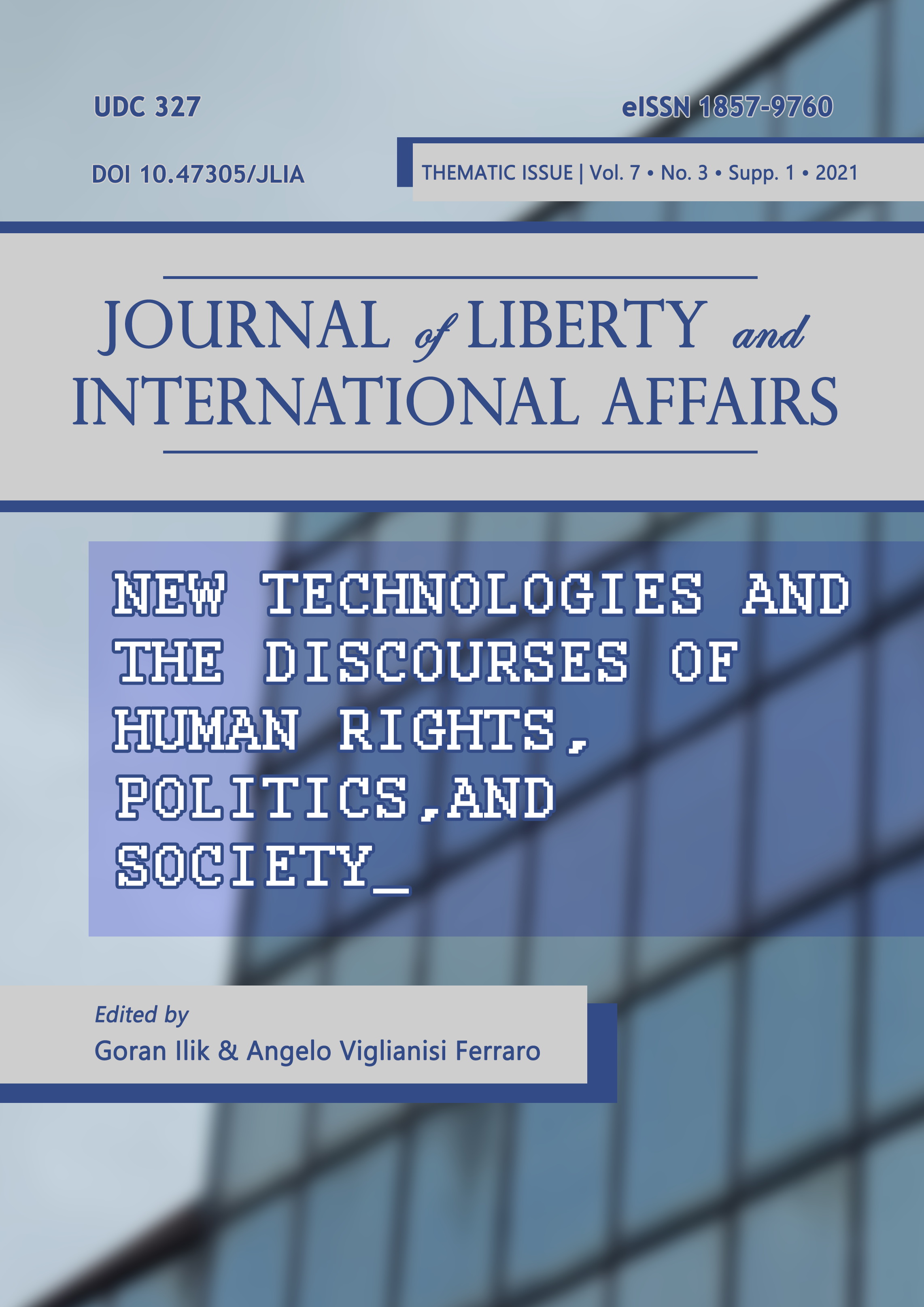
The development of new technologies is considered a revolution because it has interconnected micro and macro cultures, has influenced socio-economic developments, and is gradually transferring our social life to the virtual one. Today, life without information technology is unimaginable and every communication is done through new technologies. On the other hand, the privacy and misuse of personal data are directly endangering personal freedom. The Balkan countries are as well part of this technological development but are also heavily challenged by different unidentified risks. Kosovo has a young population and is considered to have the youngest population in Europe. About 96.4% of households have access to the internet. This paper aims to analyze the development of new technologies in societies in transition, especially in Kosovo, the challenges, the issue of privacy, and the future of information technology. The methodology applied within this paper is the study of literature and the development of qualitative research. The findings demonstrate that Kosovo has quickly embraced information technology, digitized its public services, and installed some of the region's most cutting-edge technologies, such as 3D printers, but it is also highly vulnerable to cyber-attacks.
More...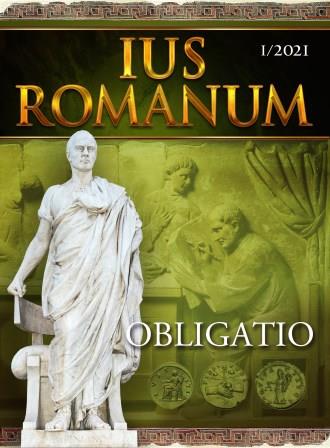
The aim of this article is to highlight the importance of the Roman legal terminology on contracts, origin of modern basic concepts such as contract, pactum, agreement, transaction (with mutual sacrifices by the parties), or unilateral promise etc., very abundant, from the legal theory’s point of view, in the Roman law. This ancient law is, nowadays, an indispensable tool referring the dialogue between the most widespread traditions in the world, i. e., the Roman-Germanic and the Common Law. In order to do that, even between national laws belonging to a common legal tradition, the analysis of the genesis and nature of the legal concepts in Roman law constitutes a fundamental task of legal interpretation. A review of the traditional theory of the sources of obligations in Roman law is also necessary. This paper, besides, affords the discussion of the recent reform of the French Civil Code concerning the sources of obligations (2016), as well as some of the different initiatives about the international unification of private law.
More...
Roman jurists had always included the loan contract among the real contracts. This is the result of a progressive refinement process started with the ‘birth’of the loan within the category of the 're obligari'. Through a riper consideration developed among the jurists, the old 're obligari' has been included in a more recent notion of 'contrahere re', where the role of the consent is definitely more relevant. A tension between the elements of the consent and delivery has been kept within the view of Roman jurists on this contract: Roman jurists had, on the one hand, vigorously defended the view of the loan as a real contract, on the other hand, had elaborated dogmatic models of loan contracts for which the delivery (traditio) was not anymore necessary for the production of the (obligatory) effects of the loan contract.
More...
This research aims to analyze the figure of the datio in solutum necessaria from its origins to the present. All this, from the terminological and practical origin of the datio in solutum, but focusing specifically on the datio in solutum necessaria. The legal figure of datio in solutum necessaria finds its origin, according to the majority doctrine, after Justinian, so it is intended to systematize its evolution until today. In modern times, the datio in solutum necessaria is not estipulated in most legal systems, with voluntary payment being the option regulated by most of the current Civil Codes. However, it is intended to demonstrate that there are legal systems that remain faithful to Justinian Roman law when it comes to providing the datio in solutum necessaria in an express manner in their legal systems.
More...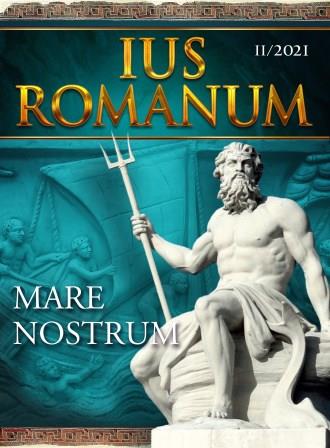
The analysis of the legal sources of the second and third centuries AD, aims to highlight the fact thatthe inclusion of the sea among the res communes omnium, and the same this category developed by Marcian are not so much the mature fruit of the discussions developed among the imperial jurists but, on the contrary, an attempt to build a special category within the res publicae, open to anyone regardless of Roman citizenship, which, however, when it was created by Marcian, would need further reflection. However, such an in-depth study was not possible due to the lack of scientific activity of the jurists after Gordian III. A close analysis of the scene of Plautus’ Rudens is also carried out, in order to attempt a correct framing of the discussion on the historical process that involved the definition of the sea as res communis omnium.
More...
This article presents some fundamental issues related to the use of the sea coast: its status from the legal and material point of view, the possibilities for its private or public use, the possibilities de construction on the coast and the beach as well as in the seabed, protection of the environment and the natural resources of the sea and the coasts. In the two parts of the article are presented the concepts of Roman jurisprudence and the modern Bulgarian legislation as well as some current problems for the Black Sea coast.
More...
The aim of this paper is to study some aspects of the International Maritime Law, especially the settlement of disputes by international courts and tribunals. It examines at the way these institutions address contemporary problems. The study explores the role of the courts and tribunals and their potential to contribute to global justice.
More...
From ancient times until today, the sea has been a border, but also - a link. The use of marine waters is dealt with in international maritime law, but it is a matter of international relations as well. A brief historical overview of the impact on the Black Sea over the centuries has been made. The problem of sovereignty is also derived from history. This issue remains relevant and controversial. In the paper, sovereignty is considered from a legal and geopolitical perspective.
More...
The issue of litus maris is not a current concern to determining the coasts of individual countries. Roman law endeavours to analyze the question and above all to attend to the needs of a community. Although terminology may have evolved, the purpose has remained the same: concern for the environment and the legal regulation for the benefit of all mankind. When mentioning res communes omnium or res publicae, we ask ourselves whether they really have a different meaning or whether, on the contrary, we can consider them synonyms. In this sense, neither the sources, nor the doctrine is unanimous. From our point of view, however, everything boils down to a terminological and semantic problem, where the purpose is one and the same: to recognize a good of an entire community, which belongs to humanity and which we cannot make unlimited use of outside the legal system itself. Once again we find a topic that, although it seems contemporary, had already been taken into account in Roman jurisprudence and literature as well. And therefore, we see the impact and influence of Roman law on our contemporary legal system.
More...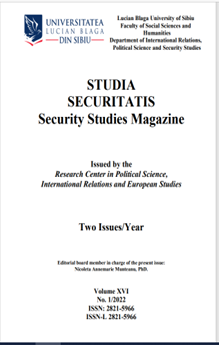
Fight against international terrorism is also led by a regional organization such as the Commonwealth of Independent States, which demonstrates the experience of effective counter-terrorism in the format of cooperation between CIS member states. This is done on the basis of the Treaty on Cooperation in Combating Terrorism (1999) drawn up in the provisions of the Protocol on the procedure and implementation of joint counter-terrorism measures on the territories of the CIS member states. Programs to combat international terrorism and other manifestations of extremism, for example, developed for the period 2020-2022, come to coordinate the efforts of the CIS states. With the understanding of the extent of the real threat of terrorism, the idea of creating a coordination center arose in the CIS, which later materialized through the creation of the CIS Anti-Terrorism Center (2000). The CIS is in a state of constructive dialogue with various international organizations to find effective ways to combat terrorism.The article will highlight the activities, the political and legal framework of the Commonwealth of Independent States as a regional security organization in the field of combating and preventing terrorism. The priority areas of cooperation between the CIS and other international organizations in the field of combating terrorism will be also analyzed.
More...
Starting from a fragment from Ulpian (D. 1.3.34), the present paper aims at presenting other ancient sources and explore if provincial custom was accepted as / considered a self-standing source of law or if it was necessary for it to be confirmed in contentious proceedings. The research also presents the relations between custom and law.
More...
After the military victory and the conquest of the whole Empire, Augustus renforced his power through a large religious programm, to show that not only men, but also the gods were now in peace and all together engaged to ensure the glory of Rome. He presented himself as the new conditor, after Romulus, and had the idea to call himself Romulus or Quirinus (the divine transfiguration of the first king). An official cult of the emperor did not rise, for political caution, and in the several provinces, the consideration of the princeps took different forms. In some of the Eastern provinces people were allowed to look at him as a god, but generally, he had a different role: he was more powerful than a simple god.
More...